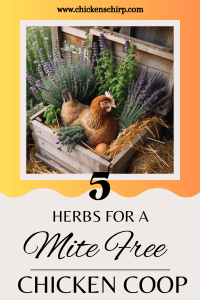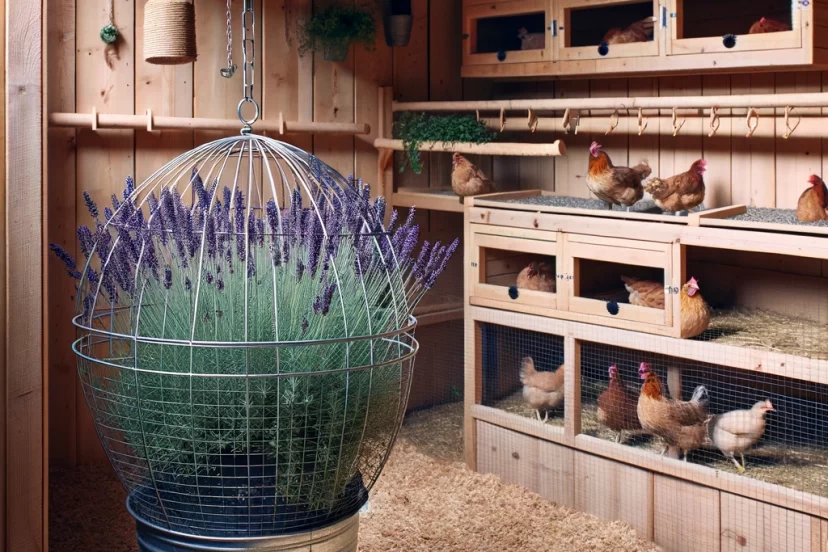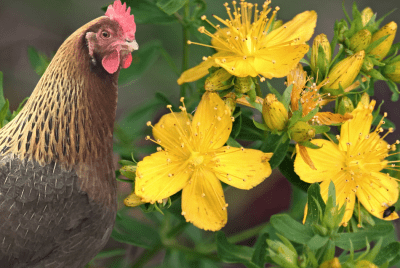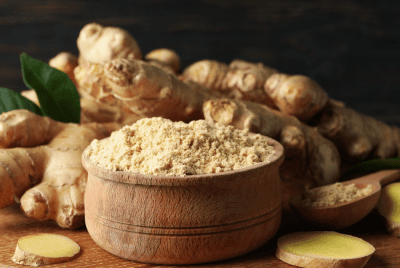5 Herbs for Chickens to Keep Your Flock Free From Pests
5 Herbs for Chickens To Keep Your Flock Free From Pests?

1. Introduction: 5 Herbs For Chickens To Keep Your Flock Free From Pests
If you can incorporate these 5 herbs for chickens into you chicken yard you will find a change will take place. Many poultry owners know the struggle of dealing with pesky pests that can wreak havoc on their flock.
Pests such as mites, lice, and flies not only can cause discomfort to the chickens but also lead to health issues and a decrease in egg production. However, there are natural solutions that can help keep your flock free from these unwanted visitors.
These herbs give off a scent that pests find repulsive and are glad to stay away from. Once I started using these herbs my life and the chickens got very much sweeter. The trick is to find the right amount and replace regularly.
By incorporating specific herbs into your chicken coop and nesting areas, you can create a pest-resistant environment for your feathered friends.
1.1. Key Takeaways:
- Mint is effective in repelling pests thanks to its strong scent and can be grown in the chicken coop or scattered around the area.
- Basil is not only a great addition to your flock’s diet but also acts as a natural insect repellent.
- Lavender can help calm and reduce stress in chickens while deterring pests with its fragrance.
- Garlic is known for its pest-repelling properties and can be added to your flock’s feed or water for protection.
- Oregano has antimicrobial and insecticidal properties, making it a beneficial herb to keep your chickens healthy and pest-free.
There are a variety of products available to assist you grow your own herbs. Get them started and then plant them in strategic locations in and around your coop.
2. 5 Herbs For Chickens: Powerhouse Herbs for Pest Control
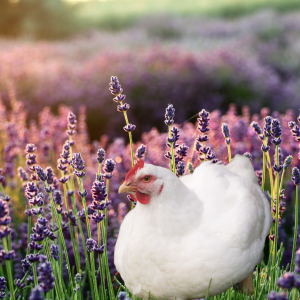
2.1. Lavender: A Fragrant Protector
The use of lavender as a natural pest repellent is not just an old wives’ tale.
Lavender is known for its natural pest-repelling properties, which makes it an excellent choice for keeping pests away from chicken coops. Here are some reasons why lavender is effective in this role:
Strong Aroma:
Lavender has a strong, pleasant scent that is soothing to humans but can be overwhelming to many pests, including mosquitoes, flies, and some types of beetles. The fragrance masks the scent of the chickens, making it harder for pests to locate them.
Essential Oils:
The essential oils present in lavender are natural insect repellents. These oils can deter pests when the plants are grown near the coop or when dried lavender is hung inside the coop.
Antiseptic Properties:
Lavender has natural antiseptic and anti-inflammatory properties, which can help in keeping the chicken coop environment clean and reducing the risk of infections.
Rodent Deterrent:
The scent of lavender is also believed to be effective in deterring rodents like mice and rats, which can be attracted to chicken feed and bedding.
Stress Reduction:
The calming effect of lavender’s fragrance is not only beneficial for humans but can also help reduce stress in chickens, leading to healthier and happier birds.
By incorporating lavender into the landscaping around the chicken coop or hanging dried lavender inside the coop, you can create a more pleasant environment for your chickens while naturally keeping pests at bay.
2.2. Mint Magic: More Than Just Fresh Breath
There’s more to mint than meets the eye – it’s not just for freshening your breath! Mint is a powerful herb that can deter pests like ants, rodents, and even spiders. Placing mint plants around your coop or using mint important oil in a DIY pest control spray can help keep your flock safe from these pesky intruders.
Mint is easy to grow and can thrive in various conditions, making it a versatile option for pest control. Its refreshing fragrance will also add a pleasant aroma to your coop, creating a more enjoyable environment for both you and your feathered friends.
You can plant these herbs in large pots with chicken wire towers over them so the chickens don’t demolish them in one sitting. Position them in strategic spots next to the run so the herbs can grow through the wire for the chickens to feast on. They will need to wait for the plant to grow through the chicken wire. In the mean time these herbs will be giving off their powerful aroma’s, pests hate these aroma’s that is why they are a deterrent.
2.3. Basil Heaven
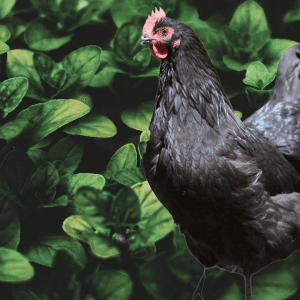
Basil is an excellent addition to a chicken yard for a number of reasons, particularly when it comes to deterring pests. Here are some specific properties of basil that make it so effective:
a. Strong Scent:
Basil emits a strong odor that many pests find repellent. This scent can mask the smell of the chickens and their feed, which might otherwise attract bugs.
b. Essential Oils:
The essential oils in basil, particularly eugenol, linalool, and citronellol, have been found to have insect-repelling properties. These oils can discourage flies, mosquitoes, and even some larger pests from entering the area.
c. Natural Insecticide:
Certain compounds in basil act as natural insecticides. For instance, the volatile oils in basil can be toxic to mosquito larvae.
d. Companion Planting:
When planted near more susceptible plants, basil can help protect them by keeping away pests such as aphids and mites, which can be a nuisance in a chicken yard.
e. Health Benefits for Chickens:
Not only does basil help repel pests, but it’s also a healthy herb for chickens to ingest. It’s high in antioxidants and has antibacterial properties, which can contribute to the overall health of the flock.
By planting basil in and around your chicken yard, you’re likely to see a reduction in pests, contributing to a healthier environment for your chickens.
3. 5 Herbs For Chickens: Cultivating a Healthy Flock

3.1. Oregano: The Antibiotic Herb for Raising Robust Chickens
When you wander into the world of poultry farming, you’ll soon discover that oregano isn’t just a staple for your pizza or pasta sauce—it’s a powerful ally in raising chickens. Let’s get into the specifics of why oregano earns the title of the ‘Antibiotic Herb’ in the avian realm.
a. Natural Disease Fighter:
Oregano oil is rich in carvacrol and thymol, two compounds that have been shown to have potent antibacterial and antifungal properties. These compounds can help in fighting off common poultry ailments like salmonella, E. coli, and avian flu, making oregano a natural alternative to pharmaceutical antibiotics.
b. Immune System Booster:
The herb works wonders in boosting the overall immune system of chickens. Packed with vitamins E and K, calcium, antioxidants, and other essential nutrients, oregano supports the development of a strong immune system that can naturally fend off diseases.
c. Gut Health Promoter:
A healthy gut is essential for a healthy chicken, and oregano contributes to gut health by promoting a balanced microbiome. It encourages the growth of beneficial gut flora, which aids digestion and nutrient absorption, while inhibiting harmful pathogens.
d. Respiratory Benefits:
Chickens, much like humans, can suffer from respiratory issues. The anti-inflammatory properties of oregano can help alleviate these problems, ensuring your chickens breathe easy and stay active.
e. Pest Repellent:
While oregano doesn’t have a pungent scent like some other herbs, its essential oils are still off-putting to many of the parasites that can plague chicken coops, such as mites and lice.
f. Egg Production Enhancer:
Incorporating oregano into the diet of laying hens has been observed to not only increase egg production but also to improve the size and quality of the eggs, which is a win-win for poultry farmers.
g. Stress Reducer:
The herb has mild sedative properties that can help reduce stress levels in chickens. Lower stress levels can lead to a decrease in aggressive behavior and an increase in overall wellbeing.
Incorporating oregano into your chickens’ diet or living environment can be as simple as sprinkling dried oregano in their feed, planting it around the coop, or adding a diluted oregano oil to their water. As you adopt more of these natural practices, you’ll likely notice happier hens clucking around, which is the real spice of life in the world of poultry farming!
Thyme to Thrive: Barrier Against Bugs
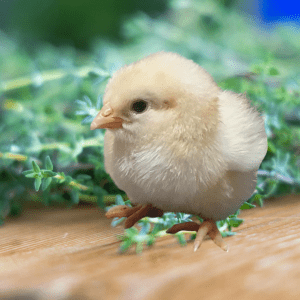
Herb thyme is not just a tasty addition to your cooking, it also serves as a natural barrier against pests for your flock. Thyme contains compounds that repel insects and can help prevent infestations in your coop.
By incorporating thyme into your flock’s environment, you are providing them with a safe and effective way to ward off unwanted bugs.
Another benefit of using thyme to keep your flock free from pests is that it is a natural and non-toxic solution.
Unlike chemical pesticides, thyme is safe for your chickens to be around, making it a great choice for promoting a healthy and thriving flock.
Incorporating Herbs into Your Coop
Establishing a Herb Garden
Keep your flock healthy and pest-free by establishing a herb garden near your chicken coop. Herbs such as mint, lavender, oregano, thyme, and basil are natural pest repellents and can provide your chickens with added nutrients. These herbs are easy to grow and maintain, making them a perfect addition to your coop’s surroundings.
Creative Ways to Introduce 5 Herbs for Chickens
Chickens love to forage and explore, so why not get creative in introducing herbs to them? Hang bunches of fresh herbs in the coop for them to peck at, scatter dried herbs in their nesting boxes for a calming effect, or mix chopped herbs into their feed for added flavor and health benefits. Your chickens will thank you for the delicious and enriching treat!
5 Herbs for Chickens: Maintaining a Pest-Free Environment
Routine Checks and Balance
After incorporating herbs into your flock’s environment, it’s important to perform routine checks to ensure the pests stay at bay. Conduct a thorough inspection of your coop and nesting boxes on a regular basis. Keep an eye out for signs of pests like mites, lice, or flies. Additionally, make sure to maintain clean bedding and surroundings to prevent infestations.
When to Seek Professional Help
Maintaining a pest-free environment is key to your flock’s health, but there are times when professional help may be necessary. If you notice a sudden increase in pest activity despite your efforts, such as an overwhelming infestation of mites or ticks, it could be time to seek assistance. A professional pest control service can provide safe and effective solutions to eliminate the pests threatening your flock.
Conclusion on 5 Herbs for Chickens
With these considerations in mind, incorporating 5 herbs for chickens like lavender, mint, thyme, oregano, and basil into your flock’s environment can help in keeping pests at bay naturally. These herbs not only act as natural repellents but also have various health benefits for your chickens. By planting these herbs around the coop or adding them to their diet, you can create a more pleasant and parasite-free environment for your feathered friends. So why not give these herbs a try and see the difference they can make in keeping your flock happy and healthy!
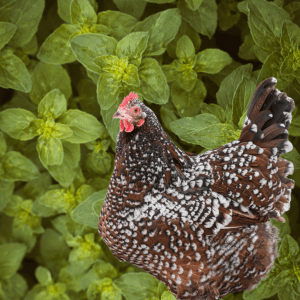
FAQ’s about Herbs for Chickens.
Q: Why should I use herbs to keep my flock free from pests?
A: Herbs have natural properties that repel pests and parasites effectively without the use of chemicals, ensuring the safety of your flock and the environment.
Q: Which are the 5 herbs for chickens that can help keep my flock free from pests?:
The 5 herbs for chickens are garlic, oregano, thyme, mint, and lavender, each with unique properties that deter pests and boost the overall health of your flock.
Q: How do I use garlic to keep pests away from my flock?
A: You can crush fresh garlic cloves and mix them with your flock’s feed or water, or plant garlic around their coop to repel a variety of pests.
Q: Can I plant the 5 herbs in my flock’s living area?
A: Yes, you can plant garlic, oregano, thyme, mint, and lavender around your flock’s coop or grazing area to create a natural barrier against pests and parasites.
Q: Are there any other benefits to using herbs for pest control in my flock?
A: Yes, besides repelling pests, herbs like garlic, oregano, thyme, mint, and lavender also have anti-inflammatory, antibacterial, and immune-boosting properties that can improve the overall health and well-being of your flock.
Rose Petals in Your CHicken Coop To keep it …
How to Deer Proof Your Chicken Coop
